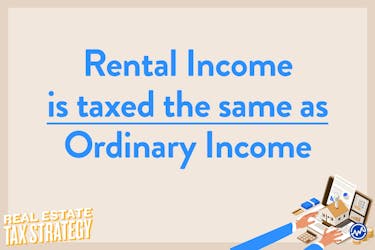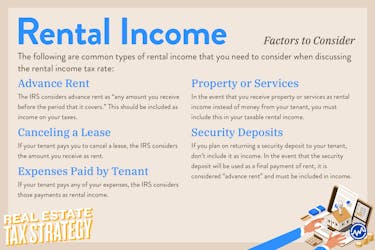

Get Access to 250+ Online Classes
Learn directly from the world’s top investors & entrepreneurs.
Get Started NowIn This Article
- How Rental Income Tax Works
- What Is The Rental Income Tax Rate?
- Rental Income Tax Rates for 2022
- Types of Rental Income
- Investment Property Tax Deductions
- How To Determine Depreciation
- Qualified Business Income Deduction
- Rental Income Tax Rate Example
- How to Report Rental Income to the IRS
- The Bottom Line: Rental Income Tax Rate
Owning a rental property can be a great source of passive income, but just like any other investment, your rental income must be reported on your annual tax return. With tax season seemingly always approaching, this brings about questions for many first-time real estate investors and even seasoned investors:
“How is rental income taxed?”
“What are the rental income tax rates?”
“Will my rental income be taxed any differently this year?”
“What are some investment property tax deductions?”
“How can I avoid an IRS audit?”
In this article, we will examine the rental income tax rate so that you can be confident that you are:
If you’re ready to learn everything you need to know about the rental income tax rate and investment property tax deductions, let’s get started!
How Rental Income Tax Works
Rental income is taxed the same way as ordinary income, with some big differences.
As the owner of a rental property, you may be entitled to some hefty deductions when you file your taxes.
In 2022, the IRS tax rates changed to allow you to earn more while paying the same tax brackets as in the previous year.
In order to benefit from tax deductions, it is important to keep good records of your income and your expenses.
There is a long list of investment property tax deductions you may be able to take advantage of, such as mortgage interest and property taxes.
Depreciation is a major tax deduction. Depreciation is based on the rental structure itself, not the land, so it is important to know how much your rental building is worth.
In addition, you may be able to take advantage of the Qualified Business Deduction (QBI) of up to 20 percent if you meet certain qualifications.
When you file your taxes for a rental property, report your income and deductions on Form 1040 and attach Schedule E. Depreciation of your rental property is reported on Form 4562.
Sound confusing? Keep reading to learn more about these tax deductions.
What Is The Rental Income Tax Rate?
You’re probably asking yourself as you fill out your taxes: what is the rental income tax rate?
To put it simply, rental income is taxed the same as ordinary income.

Rental Income Tax Rates for 2022
To calculate your rental income tax rate, simply add your rental income for the year to any other sources of income.
Using the sum of those two amounts, you can then find your tax rate based on the tax rates the IRS provides.
As defined by the IRS for the year 2022, the top tax rate maxes out at 37% for individual taxpayers with incomes greater than $539,900 or married couples filing jointly with incomes greater than $647,850.
Next, we’ll look at the tax rates to help you determine your rental income tax rate.
- 37% for individuals making more than $539,900 or couples filing jointly who made more than $647,850.
- 35% for individuals making more than $215,950 or couples filing jointly who made more than $431,900.
- 32% for individuals making more than $170,050 or couples filing jointly who made more than $340,100.
- 24% for individuals making more than $89,075 or couples filing jointly who made more than $178,150.
- 22% for individuals making more than $41,775 or couples filing jointly who made more than $83,550.
- 12% for individuals making more than $10,275 or couples filing jointly who made more than $20,550.
- 10% for individuals making $10,275 or less or couples filing jointly making $20,550 or less per year.
Next, we’ll look at:
- how you can determine your rental income
- what you should include in your rental income
- what you should exclude from your rental income
Types of Rental Income

It’s critical to keep track of all income and expenses incurred at the rental property throughout the year in order to calculate your rental income — as well as investment property tax deductions.
Because rental income is considered by the IRS as any payment you receive from anyone who uses or occupies a property, you must report all rental income received for a property.
This includes both rent for that year and any advance rent you might receive even if it is for a different year.
The following are common types of rental income that you need to consider when discussing the rental income tax rate.
Normal Rental Payments
The agreed-upon amount that the tenant pays monthly.
Advance Rent
The IRS considers advance rent as “any amount you receive before the period that it covers.”
This should be included as income on your taxes.
Canceling a Lease
If your tenant pays you to cancel a lease, the IRS considers the amount you receive as rent.
Be sure to include the payment in your rental income in the year you receive the amount.
Expenses Paid by Tenant
If your tenant pays any of your expenses, the IRS considers those payments as rental income — something important to think about with rental income tax rate.
Keep in mind that since you must include this amount in income, you can also deduct the expenses if they are deductible rental expenses, such as:
- Advertising
- Auto and travel expenses
- Cleaning and maintenance
- Commissions
- Depreciation
- Insurance
- Interest (other)
- Legal and other professional fees
- Local transportation expenses
- Management fees
- Mortgage interest paid to banks, etc.
- Points
- Rental payments
- Repairs
- Taxes
- Utilities
Property or Services
In the event that you receive property or services as rental income instead of money from your tenant, you must include this in your taxable rental income — according to the IRS, you must include the “fair market value of the property or services.”
If the services are provided at an agreed upon or specified price, the IRS considered that price as the “fair market value.”
Security Deposits
If you plan on returning a security deposit to your tenant, don’t include it as income.
But if you keep a portion or all of it, you must include the amount you keep in your income in that year.
In the event that the security deposit will be used as a final payment of rent, it is considered “advance rent” and must be included in income.
When you add these items up, you might be surprised to see this pushed you up a few tax brackets.
In the next section, we will cover deductions that can reduce your rental income tax rate and help you save you money.
Investment Property Tax Deductions
There are several investment property tax deductions to consider.
Keep in mind that you may want to consult with a tax attorney or a CPA knowledgeable in property tax deductions to make sure you get the benefits that are coming to you.
Mortgage Interest
You can’t deduct the part of your mortgage payment on your rental property that goes toward the loan principal, but you can deduct the portion that goes toward interest. You can also deduct origination fees and points that are used to purchase or refinance the rental property.
Property Taxes
Property tax can range anywhere from a few hundred dollars to thousands, or hundreds of thousands. Keep in mind that the IRS limits the amount you can deduct for property taxes.
Insurance Premiums
Many lenders require an insurance policy before issuing a mortgage. Basic homeowners’ insurance and special peril and liability insurance are also deductible.
Maintenance and Repairs
You can deduct the money you spend to keep your rental property in good condition – but not to add substantial value.
Utilities
If you pay for gas, electricity, heating, water and/or air-conditioning for your tenant, the amount you spend is tax deductible.
Professional and Legal Fees
In some cases, you can deduct fees associated with your rental property, such as:
- lawyer fees to prepare rental paperwork
- CPA services to prepare your income tax return
Travel
When you travel to oversee, collect rent or show your rental property, you can deduct travel and transportation expenses.
Depreciation
When calculating investment property tax deductions, one major deduction you can take is the cost of depreciation for the property. Since depreciation can be confusing, we’ll take a look at it in depth next.
How To Determine Depreciation
You can only depreciate the value of the buildings — not the land.
You can use Straight Line Depreciation or the Modified Accelerated Cost Recovery System. Residential rental property rented out after 1986 can be depreciated using the Modified Accelerated Cost Recovery System (MACRS).
It is a good idea to work with a qualified CPA to calculate the depreciation on your rental property accurately.
Here are the basic steps to determining depreciation:
Step 1: Determine the Basis of the Property
The basis is the amount you paid for the property, either in cash or with a mortgage. Some other costs like certain closing costs can be included.
The property is the house plus the land.
Step 2: Separate the Cost of the Building and the Land
It is important to separate the cost of the building from the cost of the land since you can only depreciate the cost of the building.
Use the fair market value at the time you purchased the property.
Step 3: Determine the Basis in the House
Use only your basis in the house when you determine depreciation.
See your most recent real estate tax assessment that should state the value of the building and the value of the land separately.
Make Adjustments When Needed
If you had certain events between the time you bought the property and the time you readied it for rental, you may have to determine the adjusted basis.
Possible increases to the basis include:
- additions and improvements
- restoring damage
- bringing utility services to the rental property
Qualified Business Income Deduction
According to the IRS, the Qualified Business Income Deduction (QBI) allows eligible taxpayers to deduct up to 20 percent of their business income.
The QBI is subject to limitations, depending on your taxable income.
As a landlord, to qualify for the QBI, you must:
- keep separate books and records for each rental enterprise
- perform at least 250 rental services per year if your real estate enterprise has been in existence for less than four years
- must keep contemporaneous time logs
Under safe harbor rules, a rental real estate enterprise is treated as a business for the QBI deduction if certain criteria are met.
Rental real estate that doesn’t meet the requirements of safe harbor may still be treated as a business to obtain the QBI deduction if it is a Section 162 business.
Rental Income Tax Rate Example
Let’s look at a rental income tax rate and investment property tax deduction example.
Let’s say you bought a property in September of last year for $250,000.
The cost basis calculated would be $250,000 divided by 27.5 years equaling out to a depreciating expense of $9,090 per year.
For your taxes this year, you would take $9,090 and multiply it by .29 (3.5 months/12 months) giving you a depreciation expense of $2,651 for the first year.
Any other costs related to the property can be used as an investment property tax deduction, including:
- maintaining the property
- repairs
- any interest paid on the property's mortgage
- advertising costs
- HOA or condo fees
- local property taxes
When taking any investment property tax deductions to reduce your rental income tax rate, be sure all expenses are ordinary and necessary.
How to Report Rental Income to the IRS
After taking all necessary deductions from your rental income and you have calculated your rental income tax rate, you must report all income and deductions on Schedule E.
Depreciation calculated on a rental property must be reported on IRS Form 4562.
The total income calculated from your rental property listed on your Schedule E form then carries onto your Form 1040.
The Bottom Line: Rental Income Tax Rate
As a real estate investor, the key for paying rental income tax is knowing how your rental income tax rate is calculated, and knowing the investment property tax deductions you can take to avoid overpaying — and save money on your taxes each year.
Here are a few more additional tax resources to help you pay less taxes legally:
- Here are 4 proven ways to pay less taxes
- Discover how homeowners save big on taxes
- Find out everything you need to know about the inheritance tax
- Learn how to fill out IRS Form 4797 for your real estate business line by line here
- Not sure where to begin the process of filing taxes? Here’s a beginner’s guide






